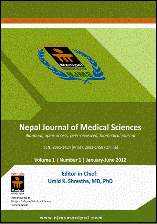Management of Head Injury by General Surgeons in a General Hospital
DOI:
https://doi.org/10.3126/njms.v1i1.5791Keywords:
Glasgow Coma Scale, head injury, traumatic brain injuryAbstract
Background: Head injury is one of the common causes of surgical admission in Western Regional Hospital, Pokhara, Nepal. With no neurosurgeons available, most of the cases are managed effectively with adequately trained general surgeons. The aim of the study is to study the epidemiology, incidence and pattern of head injury and their outcome in a setting of a general hospital where they were managed by general surgeons.
Methods: This is a prospective analytical study of 1847 head injury patients. The study defines the patterns of head injury, their management by general surgeons and outcome in surgery ward, Western Regional Hospital, Pokhara for about five years (1999 to 2003).
Results: Head injury comprised 15.5% (1847) of total admissions (11901) in surgery ward. Out of those, 80.5% (1487) were mild, 10.4% (192) moderate and 9% (168) severe head injury cases, based on Glasgow coma scale. Majority of cases (42.1%) were young adults between 21-40 years. 70% (1294) of cases were male and 30% (553) were female. 7.5% (138) cases were associated with skull fractures. Most of the cases showed good recovery. Only 2% required surgery; 3.7% were referred; 2.8% died and 0.8% left against advice.
Conclusion: Most of the cases of head injury can be managed by general surgeon in a General Hospital provided basic facilities like high dependency unit, Intensive care unit and a dedicated team are available.
Keywords: Glasgow Coma Scale; head injury; traumatic brain injury
DOI: http://dx.doi.org/10.3126/njms.v1i1.5791
Nepal Journal of Medical Sciences. 2012; 1(1): 19-22
Downloads
Downloads
How to Cite
Issue
Section
License
Copyright © by Nepal Journal of Medical Sciences. The ideas and opinions expressed by authors of articles summarized, quoted, or published in full text in this Journal represents only opinions of authors and do not necessarily reflect the official policy of Nepal Journal of Medical Sciences or the institute with which the author(s) is (are) affiliated, unless so specified.




